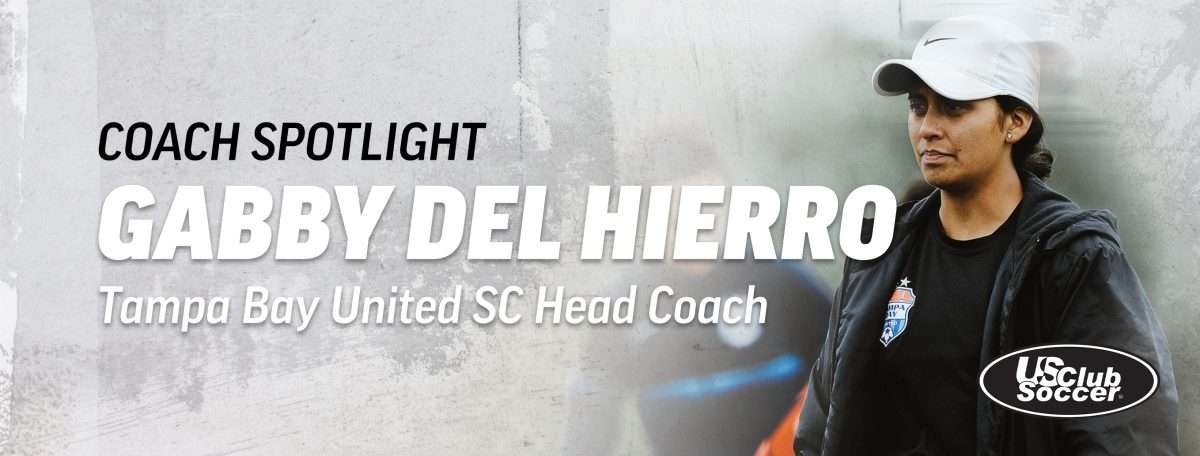Coach education spotlight: Gabby Del Hierro has 'instinct to coach'
Editor’s Note: This is one installment of an ongoing series that highlights coaches of varying backgrounds and experiences in our sport. Gabby Del Hierro, a head coach at Tampa Bay United SC, is currently taking a U.S. Soccer ‘C’ course to further her education and development.
Q: How important is it to bring more female coaches into soccer, keep them in the sport and provide opportunities for development/advancement?
Extremely important! I personally never had a female coach in the club environment. When I did finally have a female coach, it was in my senior year of high school soccer. While she was a novice coach, the team culture she created was refreshing, and I wish that I had experienced that earlier in my formative years as a player.
We need more female coaches to allow the formation of more pathways for girls and women to see that there are opportunities in the game beyond simply playing the game. The key to this is access to the licensure pathway. Personally, I have grown in confidence as I have progressed through the U.S. Soccer licensure pathway. I am currently enrolled in the C license course, and so far, it has really helped me think more deeply in the planning stages of how to construct effective training sessions that are developmentally appropriate and build towards long-term player development.
Q: What are the biggest challenges facing coaches in youth soccer, and specifically, female coaches?
I believe that the role of the youth soccer coach has evolved to include more significant responsibilities off the field. Managing the player is more holistic with a greater emphasis on building the person before developing the soccer talent. This is a great responsibility and a role that all coaches are not always adequately equipped to perform. Club leadership needs to place more of an emphasis on supporting their coaches to develop the necessary skills to match the needs of the modern player.
Parents can also be a significant challenge largely due to the pay-to-play model. Parents will always prioritize the needs of their own child; however, the coach’s primary responsibility is to manage the team environment, which can, at times, lead to conflict.
Specific to female coaches, there can be a stigma attached to not having a high-profile playing career prior to entering the coaching profession. Unfortunately, there is a perceived lack of trust in female coaches’ competence, and without elite level playing experience, this can be amplified. I believe that the solution here is for more experienced females to actively mentor younger females to work towards changing the current narrative and empower and better support the development of young female coaches.
Q: What inspired you to become a coach?
I have always had the instinct to coach, even when I was still playing. As an 8-year-old, my coach used to tell my teammates to “listen to Gabby” when we were out on the field. My first coaching role was at 17 years old, and instantly, I felt a natural rapport with the players and enjoyed being on the sideline. I took a little break from coaching after college to pursue my career goals, but when my friend’s children started to get into playing, they always asked me to train them. When they moved into club soccer with the club that I used to play for, it inspired me to take on the role of assistant coach. This quickly led to me taking on more responsibility within the club and led me back to head coaching roles.
Q: What is the most gratifying thing about coaching?
When I see the players being successful. When I see them smile with satisfaction because the effort and the time that they have committed to the learning process comes to fruition. I love to see players being competitive, as I believe that we should encourage young girls to be competitors in a healthy manner. It allows them to express their personality and love of the game.
I also love to see a player that may have been overlooked by other coaches and programs come through. We often miss late developer in soccer, as we can be too focused on the immediate result and performance. However, if we zoom out, there are many diamonds in the rough that with a little belief and a lot of support can also work towards fulfilling their potential too. We just need to be a little more patient with their process, but I gain joy in seeing these players emerge on their own timeline.
Q: What’s one thing you hope your players will learn from you?
I prioritize creating a safe and supportive learning environment that gives players a platform to express their natural game.
What I truly hope that my players learn from me is that I believe in them and their potential, and that I am invested in their development as people and as soccer players. I consider myself more of a guide that leads a player to reach their full potential while enjoying the learning process.

ABOUT US CLUB SOCCER
A National Association member of the U.S. Soccer Federation, US Club Soccer fosters the growth and development of soccer clubs in order to create the best possible environment for players of all ages.
Anchored by Players First and its pillars of Club Development, Coaching Development, Player Development, Referee Development, Parent Engagement and Player Health & Safety, US Club Soccer offers registration, league- and cup-based competition platforms, player identification and a variety of other programming, resources and services.
US Club Soccer is sponsored by Nike, DICK'S Sporting Goods and Gatorade.
usclubsoccer.org | App | Instagram | Facebook | X | YouTube |



